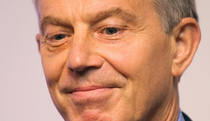 With the Swedish EU Presidency beginning, and most diplomats mildly optimistic that the Lisbon treaty will be approved by the Irish in a new referendum, European leaders have turned their attention to filling Europe’s top jobs.
With the Swedish EU Presidency beginning, and most diplomats mildly optimistic that the Lisbon treaty will be approved by the Irish in a new referendum, European leaders have turned their attention to filling Europe’s top jobs.
But Tony Blair, who looked a shoo-in for the post of President of the European Council (not quite the “President of the EU”), now looks as if he has been dropped. Blair’s main backer, Nicolas Sarkozy, is said to have gone off the idea of bringing his British friend back from the political cold; while Germany’s Chancellor, Angela Merkel, was never keen.
Four candidates have emerged in his stead: Luxembourg’s long-serving leader Jean-Claude Juncker, Austria’s former Chancellor Wolfgang Schüssel, ex-Belgian Prime Minister Guy Verhofstadt and former Spanish leader Felipe Gonzales. Of the four, the right-wing Schüssel is the least federalist and has voiced strong opposition to Turkish EU membership, a view that will endear him to President Sarkozy.
But Gonzales, a former long-serving Socialist Prime Minister of Spain, is also strong contender. He currently heads a Wise Man’s group, dreamt up by President Sarkozy, which is thinking about Europe’s future – a perfect perch from which to craft a manifesto for any presidential bid.
With centre-right leaders likely at the helm of the Commission (Jose Manuel Barrosso), the European Parliament (Jerzy Buzek) and possibly the Council, a centre-left, candidate from northern Europe will be preferred choice for the post of High Representative for CSFP i.e. the bloc’s foreign minister. That too may mean Britain loses out. Talk of David Miliband or Chris Patten being put forward for the job has subsided, and attention is turning to Finland’s Oli Rehn, who now works as Enlargement Commissioner, and Swedish foreign minister Carl Bildt.
Come the autumn, Britain may find itself without any plum European jobs. With the Conservatives having now left the EPP, which most insiders believe will weaken the power of the cross-party British contingent in the European Parliament, it all points to less British influence in the EU. Ironically, the person who could probably secure the top job of Council President for Britain is Gordon Brown. Both Sarkozy and Merkel are likely to back a Brown presidency, which would ensure that the job focuses on Europe’s economy (unlike a Blair tenure, which would be much broader in scope). Dispatching Brown to Brussels may also be best for the Labour Party; who could offer their embattled leader an honourable exit, while allowing, say, Alan Johnson to prevent the party’s electoral decimation.
But when the EU’s new leaders line up for their first class photo, don’t expect to see a Briton among them.






Comments